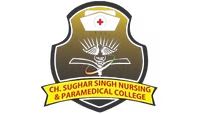A.N.M. (Auxiliary Nursing Midwifery)

A.N.M. (Auxiliary Nursing Midwifery)
The Auxiliary Nursing Midwifery (A.N.M.) course is a foundation-level nursing diploma program designed to prepare students for delivering essential healthcare services in rural and urban communities. This program emphasizes maternal and child health, community health, midwifery, and basic nursing care, enabling students to become skilled frontline healthcare providers.
At Ch. Sughar Singh Nursing & Paramedical College, our A.N.M. course blends theoretical knowledge with practical training, ensuring that students are well-equipped to meet the healthcare needs of society. With a focus on compassion, discipline, and professionalism, we prepare our students to become confident and responsible healthcare workers, capable of serving in hospitals, clinics, and community health centers.
Overview
The Auxiliary Nursing Midwifery (A.N.M.) course is a two-year diploma program designed to prepare students in the field of basic nursing and midwifery services. It focuses on equipping learners with essential knowledge and practical skills in community health, maternal and child care, family welfare, first aid, nutrition, and preventive healthcare practices. This program is highly career-oriented and ideal for those who aspire to serve society through healthcare.
At Ch. Sughar Singh Nursing & Paramedical College, we believe that nursing is not only a profession but also a calling. Our A.N.M. program combines theoretical knowledge, laboratory training, and extensive clinical exposure, ensuring that students gain the confidence to serve patients with compassion and professionalism. The curriculum covers a wide spectrum, including nursing fundamentals, midwifery, communicable diseases, community health, and health promotion techniques, enabling students to develop a strong foundation in primary healthcare.
A distinctive feature of our A.N.M. course is the emphasis on field training and real-world experience. Students participate in hospital postings, community visits, rural health awareness programs, and government healthcare initiatives, which help them understand the practical challenges of healthcare delivery. This hands-on learning approach not only enhances their clinical competence but also strengthens their decision-making and problem-solving abilities in diverse healthcare situations.
Additionally, we focus on the holistic development of our students. Through workshops, seminars, personality development sessions, and communication skill training, we ensure that our learners become confident, empathetic, and well-rounded healthcare providers. Our faculty members, with years of expertise in nursing education, provide personalized attention and guidance to every student.
Upon successful completion of the course, graduates are registered as Auxiliary Nurse Midwives (ANM). They play a crucial role in delivering primary healthcare services across rural and urban areas, often serving as the first point of contact for patients. The program opens up diverse career opportunities in government hospitals, private healthcare organizations, NGOs, community health projects, and international healthcare sectors. Moreover, students can pursue higher studies such as GNM, B.Sc. Nursing, and Post-Basic B.Sc. Nursing, creating a pathway toward a rewarding and progressive nursing career.
Career Opportunities After A.N.M.
Completing the Auxiliary Nursing Midwifery (A.N.M.) diploma opens the door to a wide range of career possibilities in the healthcare sector. ANMs are often considered the backbone of primary healthcare services, especially in rural and community settings, where they serve as the first point of contact for patients. With strong demand for skilled healthcare workers in hospitals, clinics, NGOs, public health programs, and international healthcare organizations, A.N.M. graduates enjoy diverse career options and professional growth.
As registered Auxiliary Nurse Midwives, graduates can take up positions in community health programs, maternal and child care units, government health missions, and private healthcare facilities. Their training enables them to handle responsibilities such as assisting doctors, providing first aid, conducting immunization drives, supporting deliveries, maintaining patient records, and creating health awareness in communities. This makes ANMs crucial contributors to India’s healthcare delivery system.
Job Roles for ANM Graduates
After gaining some experience, ANM diploma holders can work in various capacities, such as:
Community Health Nurse – Serving in rural or urban health projects.
ICU Nurse – Assisting in intensive care units with critical patient support.
Staff Nurse – Providing general nursing care in hospitals and clinics.
Nursing Tutor – Training and mentoring nursing students in institutions.
Certified Nursing Assistant – Supporting senior nurses in patient care.
Senior Nurse Educator – Teaching and guiding in advanced nursing education.
Home Care Nurse – Providing healthcare services at patients’ homes.
Health Care Nurse – Serving in private and government healthcare centers.
Teacher – Nursing Schools – Taking up academic roles in training institutions.
Scope for Higher Studies
The A.N.M. course not only provides immediate employment opportunities but also lays the foundation for higher education in nursing. After completing A.N.M., graduates can pursue:
G.N.M. (General Nursing & Midwifery) – A diploma program that further advances clinical and nursing skills.
B.Sc. Nursing / Post Basic B.Sc. Nursing – A degree course for those aiming at professional nursing roles in India and abroad.
Specialized Nursing Courses – Opportunities in pediatric, psychiatric, critical care, and community nursing.
Career Growth & Future Scope
With India’s growing focus on universal healthcare, maternal health, and preventive medicine, the demand for trained ANMs is steadily increasing. Graduates can expect a stable, respectable, and fulfilling career in healthcare, with opportunities to work both in government health missions like NRHM (National Rural Health Mission) and in private hospitals across the country. Additionally, international healthcare organizations also recruit skilled ANMs, making global opportunities accessible.
By choosing A.N.M. at Ch. Sughar Singh Nursing & Paramedical College, students set themselves on a path that is not only professionally rewarding but also socially impactful, as they contribute to improving the overall health and well-being of society.
Eligibility Criteria for A.N.M. (2-Year Course)
Age Requirement
The minimum age for admission is 17 years at the time of registration.
Minimum Qualifications (As per INC Regulation)
Candidates must have passed 10+2 from a recognized board with a minimum of 50% marks.
Applicants must be Registered Nurses or Registered Midwives from a recognized State Nursing Council or University.
